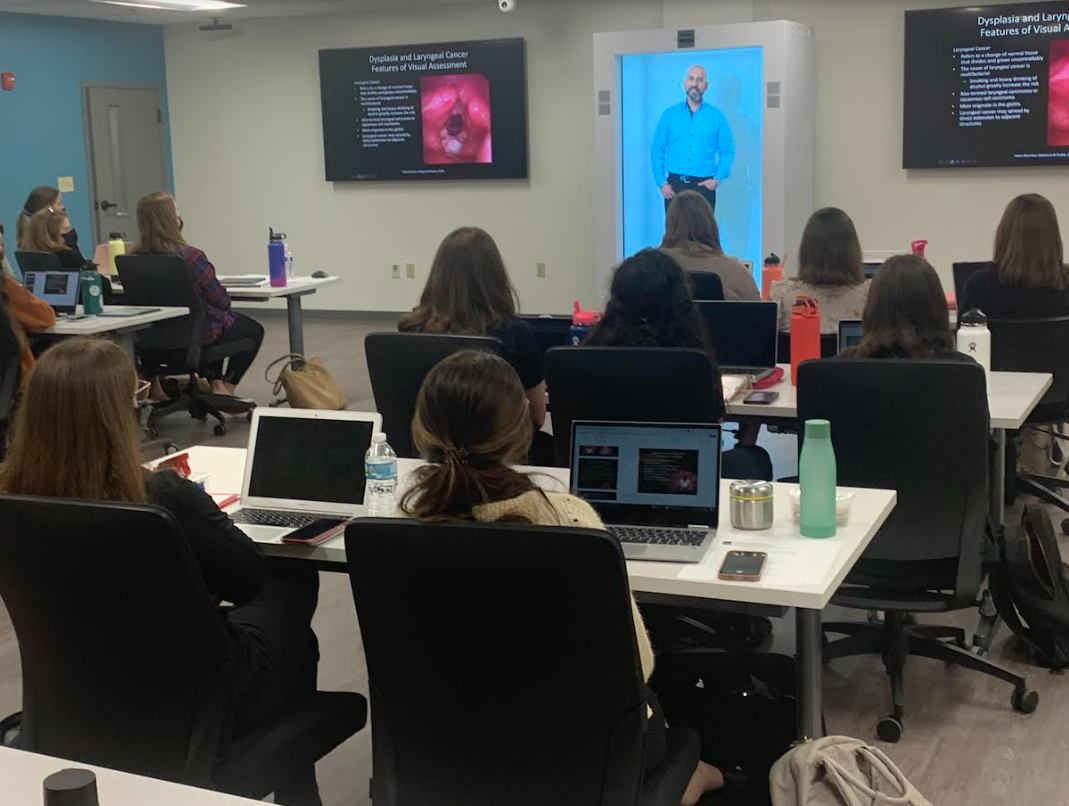
Over the past three years, holograms have become a vital tool for faculty teaching future healthcare professionals at the University of Central Florida.
“We use the technology to engage our students to learn more in the area of patients' lived experiences to expose students to a wide variety of patient conditions,” says Dr. Bari Hoffman, associate dean for Clinical Affairs at the College of Health Professions and Sciences at the university.
This takes the form of live beaming in expert speakers or having a hologram video taken of a patient with a rare condition, which allows students to see how these conditions present in the real world. It's an experience to which previous generations of students might never have been exposed.
“The gap we're trying to close is how do we really train our students to be workforce-ready and to engage at a higher level as they're just coming out and entering into these clinical careers,” Hoffman says.
Hologram technology, though still rare, is increasingly being used to teach students in various STEM fields at colleges, hospitals, and other areas in which professional training might be necessary. Modern hologram technology is not a true hologram 3D projection — instead, hologram devices, some of which can sit on a desk and others that are larger than a fridge, create the illusion of 3D people and objects. A person “beamed” into a large hologram display seems as if they are really in the room, Hoffman says. This provides a much more immersive experience for students than a mere video or Zoom-style call could.
STEM Holograms In Action
Some recent examples of STEM hologram lessons in action at the University of Central Florida include a keynote symposium speaker who was live beamed into a university symposium to discuss exercise oncology, as well as a physician with the Veterans Affairs who spoke to various classes about neurological assessments at the VA and career pathways. The university is also studying the potential use for holograms as a new form of telehealth, Hoffman says.
Beyond expert speakers and patient observations, holograms can also be used to help students learn about and design various tools. “We've used this with an engineering project with our students,” Hoffman says. “We are adapting toys and tools from 3D-printed switches for children who need assistive technology. So we will have the small hologram machines on different tables, and the students go around and get trained to utilize these tools and adapt these toys.”
Beyond STEM
The utility of holograms extends beyond STEM education. The University of Central Florida has used these to support a variety of other education applications.
One fun use of holograms is at the university’s annual UCF Celebrates The Art Festival. “We've put the technology on stage and beamed in alumni performers who are on Broadway now, “ Hoffman says. The holograms have also been used to showcase sculptures and other works of art that could not be transported to the university.
In a separate event, comedian Howie Mandel was beamed in to talk to students about neurodiversity. Since the technology is so lifelike, students were able to take pictures standing next to Mandel. In these images, the students and Mandel appear to be in the same space.
Advice For Educators
Hoffman is regularly contacted by those at other universities and hospitals looking for information about how to implement hologram technology for education at their institutions. One consideration she talks educators through is the level of technical support necessary to implement the technology. But arguably more important is having educators on campus who are excited about using holograms in their teaching practice.
“It’s really hard to launch something and have it be integrated into the curriculum if the faculty who are engaged in the teaching and the training of the students aren't champions for it and don't see that it fills a gap or enhances what they’re already doing," Hoffman says.







